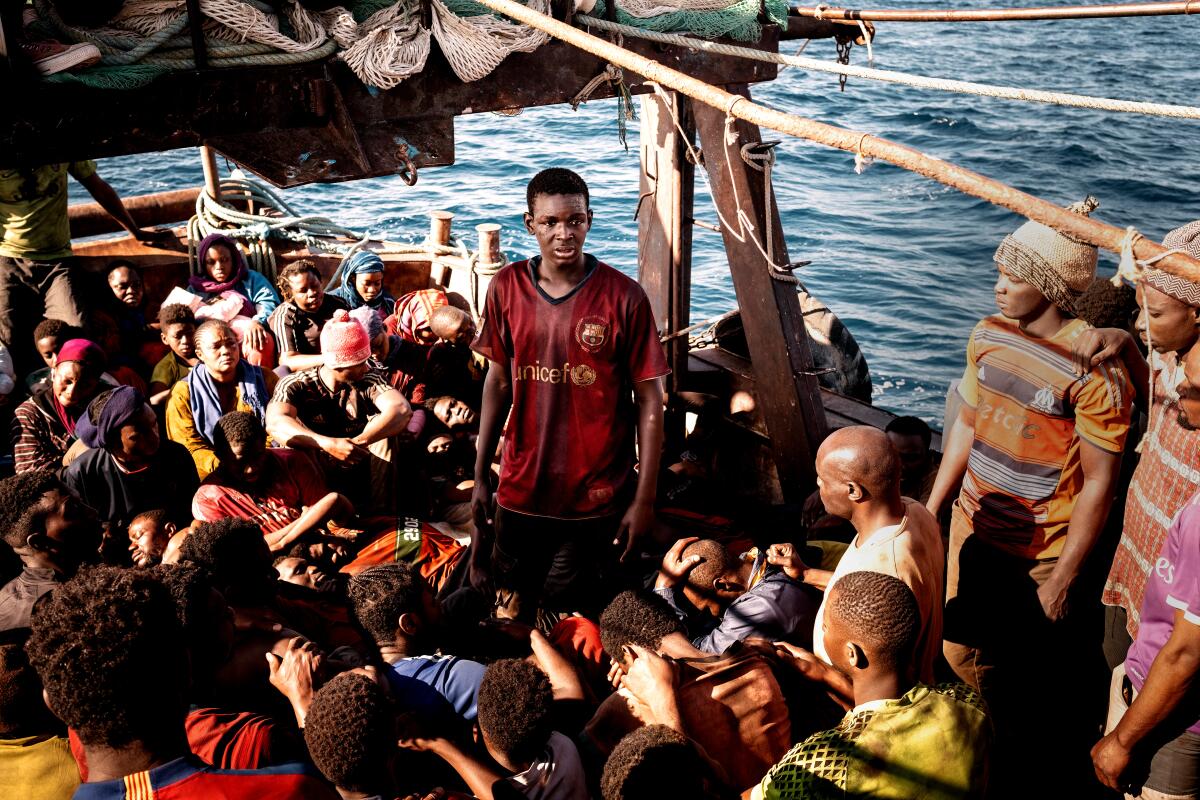The harrowing migrant story of âIo Capitanoâ is pope-approved

Landing roles in Matteo Garroneâs âIo Capitanoâ was a life-changing experience for Seydou Sarr and Moustapha Fall. The young Senegalese actors were cast to play African migrants Seydou and Moussa, respectively. Two young men hoping to live out their dreams in Europe and, eventually, the United States, after crossing the African continent and the Mediterranean Sea. Their director, best known for 2008âs âGomorrah,â threw them a curveball for their first real professional gigs, though. It turns out no one in the cast ever had a complete screenplay.
âThey made this journey without knowing how itâs going to end, because we didnât give the script to them,â Garrone reveals. âEvery day they were discovering a new adventure, and they didnât know if they were going to succeed or not.â
Shot as chronologically as possible, âIo Capitanoâ follows Seydou and Moussa as they are forced to pay off countless smugglers, trek across a hot desert, deal with violent Libyan soldiers, fall victim to human traffickers, and, eventually, guide a packed, rickety old boat full of other migrants across the sea. The details would be almost unbelievable if every chapter in the movie wasnât based on true events and Garrone collaborated with three different screenwriters to make sure the film was as accurate as possible. Garrone refers to his tale, Italyâs Oscar nominee for international film, as âthe most dramatic tragedy of our time,â the universal desire to find a better life.
âIn the States, you have [this story] with Mexican or with Venezuela [migrants]. But not everyone knows how big the tragedy is [here],â Garrone says. âWe know in Europe. We know that people die in the desert. We know that people died in Libya in prison, we know that people died in the sea. So we wanted to give the audience an emotional experience through the eyes of the actor. That was what pushed us to tell this story, to show to the world that this journey is not only made by people that escape from war like we used to think, but also by young people. That itâs involved in globalization, because sometimes we forget that globalization has arrived very strong also in Africa.â
For example, the 55-year-old filmmaker notes that social media has made its way to the phones of young people in Africa. They view whatâs occurring in Europe and the United States. They chat and write online. They view images that create dreams and promise something new. What young people such as Seydou and Moussa donât tend to see is the real-world struggles of anyone living on the other side of those photos and videos.
At the core of âIo Capitano,â however, is Seydouâs journey, which transforms him from one of many faceless migrants into a genuine hero. A hero, Garrone says, âthat fights for life in a system of injustice where all the basic human rights are completely destroyed.â And much of the credit for the movieâs emotional impact is thanks to the captivating Sarr for his performance as Seydou.
âSometimes when you work with actors, they have the opportunity to show maybe in a scene how they good they are,â Garrone admits. âSometimes you can feel something narcissistic [in that, and] I never had this feeling with Seydou. He was always very simple, and he was always looking inside himself, never to show how good he was. And I think it was a good lesson and also made my job so intense and profound. He helped me a lot with this innocence in a way.â
Shooting sequentially was a challenge. The production began in Senegal and then transitioned to the deserts of Morocco. The end of filming saw everyone in the comfortable confines of Sicily to shoot the boat scenes, which didnât necessarily assist with the urgency Garrone wanted to keep on set.
âThe problem was that they arrive in Italy two weeks before the character. They were like in the swimming pool, drinking, playing, eating very well,â Garrone says. âAnd then the day after they were going to the boat. But the approach was completely less intense, because they arrived in Italy much before the character. I tried to say, âPlease donât stop, we have done all this, in two weeks, keep the concentration please.â And after a while, I start to finally have their concentration back.â
Despite the obvious political controversy regarding migrants in all corners of the world, Garrone insists âIo Capitanoâ is ânot a thesis movie.â There are no easy answers regarding such a complex issue. Instead, he is attempting to give a point of view of the young people who decide to embark upon such an arduous journey. That positive portrayal could be a call to arms to many politicians stoking the flames of anti-immigrant policies, but Garrone was gifted a distinctly Italian lifesaver when the movie arrived in local theaters.
âA week after the release in Italy, Pope Francis decided to screen the movie in the Vatican. He wanted to support the movie, because heâs always been from the side of the immigrant,â Garrone says. âHis parents were migrants; he knows thatâs the tragedy of our time. I think this helps us to be on a superior level. We never had any political discussion with the political groups in Italy, because the pope in a way [gave a stamp of approval].â
More to Read
From the Oscars to the Emmys.
Get the Envelope newsletter for exclusive awards season coverage, behind-the-scenes stories from the Envelope podcast and columnist Glenn Whippâs must-read analysis.
You may occasionally receive promotional content from the Los Angeles Times.










